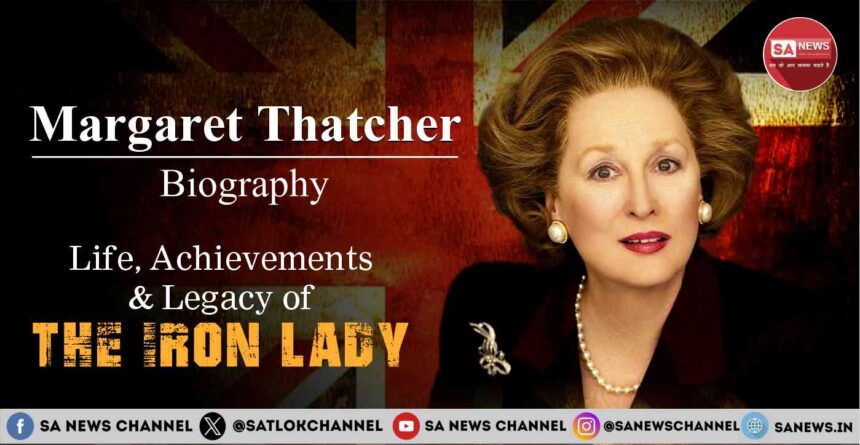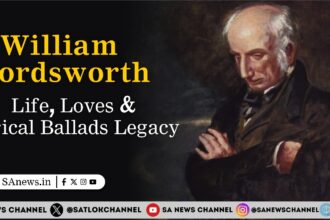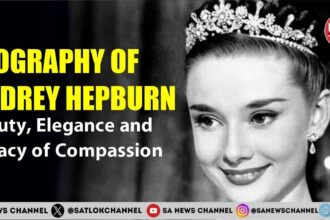Margaret Thatcher was the first woman Prime Minister to serve the United Kingdom. She held the office from 1979 to 1990. Because of her uncompromising political style, she was known as the “Iron Lady.” In 20th-century politics, she was a defining figure. She was the leader of the Conservative Party. She reshaped the British economy, introducing a wave of economic reforms and market-driven policies. Thatcher is one of the most influential and polarizing figures in British history.
- Early Life and Education
- Political Career Beginnings
- Prime Minister of the United Kingdom
- First Term Achievements (1979–1983)
- Second Term Highlights (1983–1987)
- Third Term and Final Years in Office (1987–1990)
- The Falklands War and Foreign Policy
- Economic Reforms and the Thatcher Doctrine
- Challenges and Controversies
- Life After Politics
- Margaret Thatcher: Death and Legacy
- Fun Facts About Margaret Thatcher
- The Real Purpose Of Life
- Frequently Asked Questions About Margaret Thatcher
- Q1: When did Margaret Thatcher become Prime Minister?
- Q2: How long did Margaret Thatcher serve as Prime Minister?
- Q3: What was Margaret Thatcher’s most famous policy?
- Q4: Did Margaret Thatcher have children?
- Q5: Why was she called the “Iron Lady”?
- Q6: What did she study in college?
- Q7: Is Margaret Thatcher still alive?
- Connect With Us on the Following Social Media Platforms
Early Life and Education
Biography of Margaret Thatcher: Margaret Hilda Roberts was born on October 13, 1925, in Grantham, Lincolnshire. Her parents were Alfred Roberts and Beatrice Roberts. Her father was a grocer and a lay Methodist preacher. He influenced her strong work ethic and conservative values. Her husband was Denis Thatcher. She married in 1951. He supported her during campaigns, along with her parents, even before marriage.

In her early years, she attended Kesteven and Grantham Girls’ School. Then she studied Chemistry at Somerville College, Oxford, where she got actively involved in politics. She also became the President of the Oxford University Conservative Association in 1946. Her academic excellence and active involvement in student politics laid the foundation of her remarkable political journey.
Political Career Beginnings
Entry into Parliament
After working briefly as a research chemist and studying law, she contested several parliamentary elections. She got elected as a Member of Parliament for Finchley in 1959. She focused on issues such as housing and education in her early years in the House of Commons. This earned her a reputation for her intellect and determination.
Rise Through the Conservative Party
By the 1960s and early 1970s, Thatcher served various party positions and ranks, including Secretary of State for Education and Science under Prime Minister Edward Heath. She became famous for controversial cuts to education spending, such as the withdrawal of free school milk for children. She got the nickname “Margaret Thatcher, Milk Snatcher.”
Prime Minister of the United Kingdom
First Term Achievements (1979–1983)
Margaret Thatcher became Prime Minister of the UK in 1979. Her first term was focused on controlling inflation and reducing government intervention in the economy. She emphasized individual responsibility and privatization of state-owned industries, and also curbed the power of trade unions.
Also Read: Abraham Lincoln Biography – Life, Legacy & Leadership of America’s 16th President
Second Term Highlights (1983–1987)
During the Falklands War in 1982, her leadership significantly boosted her popularity. This led to a landslide victory in the general elections of 1983. In her second term, Thatcher introduced deep economic reforms including the sale of public housing and more privatization. During the Cold War, she also stood firmly with U.S. President Ronald Reagan, strengthening the US-UK alliance.
Third Term and Final Years in Office (1987–1990)
During her third term, Thatcher introduced the highly unpopular Community Charge (poll tax), which sparked nationwide protests. Dissatisfaction in her party grew, especially over her stance against the European Union. Facing internal revolt, in November 1990, she resigned as Prime Minister and was succeeded by John Major.
The Falklands War and Foreign Policy
One of Thatcher’s defining moments was the Falklands War in 1982, when Argentina invaded the British territory. Thatcher’s swift military response and ultimate victory reinforced her strong leadership image. She took a hardline stance against communism and supported NATO policies during the Cold War.
Economic Reforms and the Thatcher Doctrine

Thatcher’s economic philosophy, known as “Thatcherism,” was mainly focused on deregulation, lower taxes, reduced social welfare, and privatization of national industries. Even though these were controversial, these reforms significantly altered the UK economy and global conservative policies.
Challenges and Controversies
Opposition and Public Response
- Margaret Thatcher faced significant backlash from labor unions, working-class communities, and left-leaning groups.
- Her policies were also accused of increasing unemployment and widening income inequality.
- The miners’ strike of 1984–85 was a major flashpoint during her tenure.
Resignation and Aftermath
Implementation of the poll tax and her opposition to deeper European integration led to a leadership challenge within her party. She lost support from key Cabinet members. Thatcher stepped down in 1990. Her resignation marked the end of an era, but not her influence on political thought.
Legacy of Policies
Even after leaving office, Thatcher’s policies continued to shape British politics. Successive governments, including Labour under Tony Blair, adopted several of her policies. Her legacy is viewed with both reverence and criticism depending on political perspective.
Life After Politics
Memoirs and Public Appearances
After her resignation, Thatcher remained active in political and international circles. She wrote two volumes of memoirs—The Downing Street Years and The Path to Power—and gave lectures around the world. Her presence loomed large in Conservative politics.
Health Decline and Later Years
In her last years, Thatcher suffered from dementia and withdrew from public life. Her husband passed away in the year 2003. She made her final public appearance in 2010 at the unveiling of a statue of Ronald Reagan in London.
Margaret Thatcher: Death and Legacy

At the age of 87, Margaret Thatcher died on 8 April 2013 due to a stroke. World leaders and dignitaries paid tribute to her influence. Her last ceremonial funeral was held at St. Paul’s Cathedral with military honors, attended by Queen Elizabeth II and political figures from across the globe.
Honors and Memorials
Thatcher received numerous awards and honors during and after her life, including a life peerage as Baroness Thatcher. Statues, foundations, and various programs have been established in her name. This reflects her enduring impact on both national and global politics.
Margaret Thatcher’s Influence on Modern Politics
Her legacy continues to shape British conservatism and global economic policy. Whether praised as a savior of Britain or criticized for fostering inequality, Margaret Thatcher was one of the most significant political figures of the 20th century.
Fun Facts About Margaret Thatcher
She has been portrayed in films, plays, and shows, including The Iron Lady (2011), where Meryl Streep played her.
Before going into politics, Thatcher was educated as a chemist and enjoyed classical music. Her rigorous schedules, strong voice modulation, and great loyalty to British customs made her well-known.
The Real Purpose Of Life
The True Meaning of Life Saint Rampal Ji Maharaj reminds us that achieving salvation (moksha) is the ultimate goal of human life, even though Thatcher’s life was characterized by public service and policymaking. Without Satbhakti (true worship), a person cannot break free from the cycle of birth and death, regardless of how powerful or great they become in society.
An Appeal for the Pursuit of Ultimate Knowledge To find the real path of worship, Saint Rampal Ji Maharaj advises people to read the sacred texts, such as the Bible, Quran, Vedas, Shrimad Bhagavad Gita, and Kabir Sagar. Spiritual awakening and a relationship with the Almighty God are what really count in the modern world, where even world leaders like Thatcher are remembered for their influence.
Frequently Asked Questions About Margaret Thatcher
Q1: When did Margaret Thatcher become Prime Minister?
She became Prime Minister in May 1979.
Q2: How long did Margaret Thatcher serve as Prime Minister?
She served for 11 years, from 1979 to 1990.
Q3: What was Margaret Thatcher’s most famous policy?
Privatization of state-owned industries and her stance against trade unions.
Q4: Did Margaret Thatcher have children?
Yes, she had twins—Mark and Carol Thatcher.
Q5: Why was she called the “Iron Lady”?
Due to her tough stance on communism and strong leadership style.
Q6: What did she study in college?
She studied Chemistry at Oxford University.
Q7: Is Margaret Thatcher still alive?
No, she passed away in 2013.









